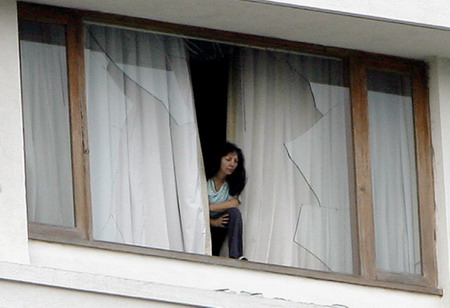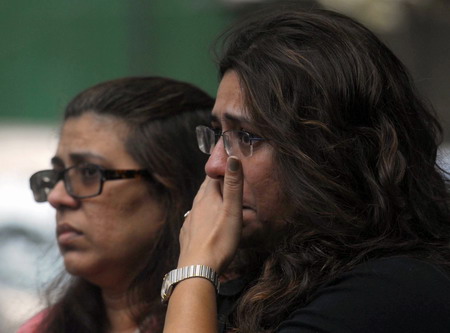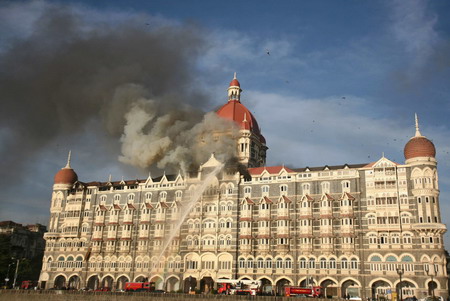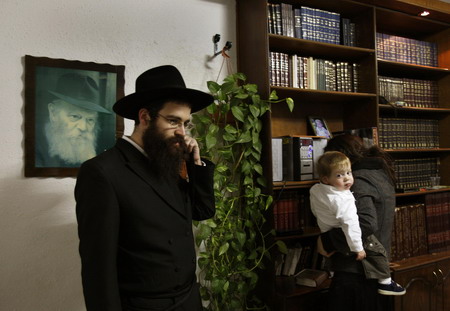About 10 p.m., Oberoi Hotel
Joseph Joy Pulithara, a waiter, is working in the Chinese restaurant of this modern luxurious monolith when the gunfire starts, sending diners and staff scrambling. Pulithara is shot in the leg. A woman nearby him is shot in the head.
The gunmen run into another restaurant and fire unrelenting bursts at the diners and waiters, says Andreina Varagona, an American meditation teacher shot in the arm and leg. At least a dozen people fall to the floor dead, including one of Varagona's friends.
"There were bodies everywhere," Varagona says. "I felt like I was in a movie."

A hotel guest looks out from a broken window of the besieged Trident-Oberoi Hotel in in Mumbai November 28, 2008. [Agencies]
|
The attackers herd dozens of survivors into a stairwell. One demands to see their IDs, saying he was looking for Americans and Britons. Then he forces them upstairs, says Alex Chamberlain, a British guest.
Chamberlain and many others throughout the hotel dash out in the chaos.
Staff in one restaurant spirit at least 60 diners into a back kitchen and then hustle them to another room where they are served refreshments and then escorted outside, according to the hotel's chairman P.R.S. Oberoi.
Other guests barricade themselves in their rooms.
The gunmen are taking hostages.
----
10:35 p.m.
Gunmen briefly attack a police station. A few minutes later they open fire at a hospital, then ambush a police car, killing five officers and driving away. Soon after, a bomb explodes in a taxi in the suburban neighborhood of Vile Parle. About 15 minutes later, a bomb goes off in another taxi inside the city. One person is believed killed.
----
Thursday morning, The Oberoi
A banner hanging from a window carries a simple but wrenching plea: "Save Us."
Inside, hundreds are hiding in their rooms, or being held hostage.

Unidentified relatives of hostages wait outside the besieged Trident-Oberoi Hotel in Mumbai November 28, 2008. [Agencies]
|
The gunmen, armed with rifles and grenades, push Egyptian businessman Osama Embabi into a room where four or five people, guests from other Arab countries and hotel workers, are already being held.
"They shouted and warned us not to leave the room or we would be shot," he says.
Meanwhile, Lo Hoei Yen, a 28-year-old Singaporean lawyer, calls her husband, Michael, from her cell phone. She is being held captive, she tells him, and the gunmen threaten to kill her if Indian forces storm the hotel, Singapore media reports say.
After 9 a.m., Indian forces begin what will be a daylong operation to rescue the Oberoi hostages.
Lo's body is found on the 19th floor.
----
Thursday
Across the city, it seems the Indian police and military may never catch up.

Firefighters try to douse a fire at the Taj Mahal hotel in Mumbai November 27, 2008. [Agencies]
|
They are fighting gunmen in three locations, including two of the city's most famous landmarks, and hundreds of people are trapped. Fires burn occasionally in both hotels, and firefighters with water hoses and cherry pickers battle the blazes, but only when it's safe enough to approach the buildings. Gunshots and explosions have become the soundtrack of south Mumbai.
Residents have faced terrorism before, but this time it seems different.
"There is a limit a city can take," says Ayesha Dar, a 33-year-old homemaker.
----
10:45 a.m., Nariman House
The Jewish center is silent, except for the wailing of a child.
Samuel, the maid, cracks open the door of her hiding place and sees a deserted staircase. She runs up one flight and finds the rabbi's 2-year-old son Moshe crying beside his parents and two Israeli guests who lay still on the floor. His pants are drenched with blood. She grabs the boy, bolts down the stairs and out of the building.

Relatives of Rivkah Holtzberg listen to the news in the radio at her relative's house in Kfar Chabad near Tel Aviv November 29, 2008. Rabbi Gavriel Holtzberg and his wife, Rivka Holtzberg, were among the five hostages killed at the center and more than 195 people dead in Mumbai after the attacks by Islamist militants on luxury hotels and other sites in India's financial capital. [Agencies]
|
The soldiers who fought the gunman say they were tough, bitter opponents.
"It's obvious they were trained somewhere ... Not everyone can handle the AK series of weapons or throw grenades like that," an unidentified member of India's Marine Commando unit, his face wrapped in a black mask, tells reporters after his units stormed the hotels. The attackers were "very determined and remorseless."

